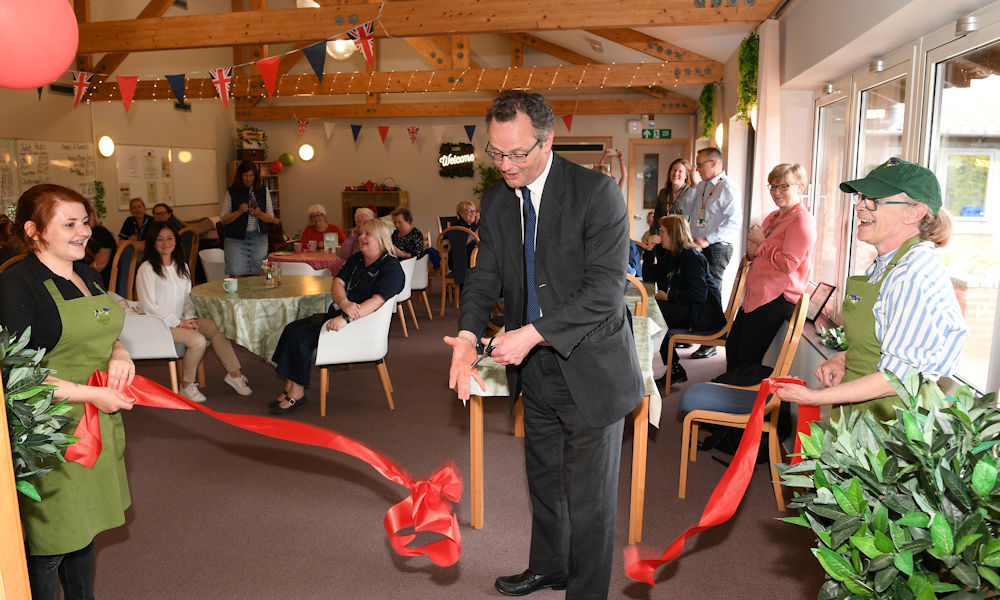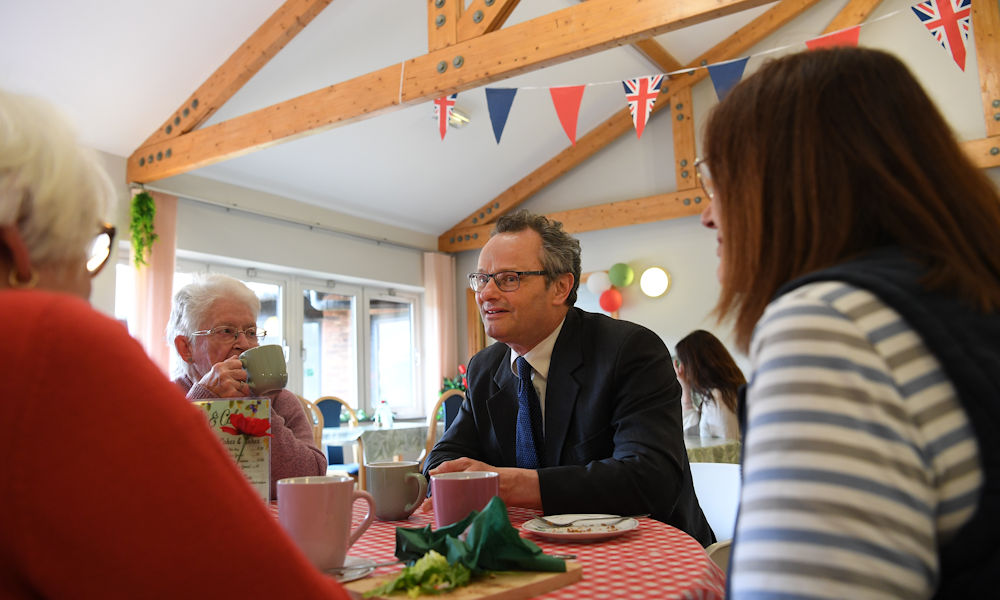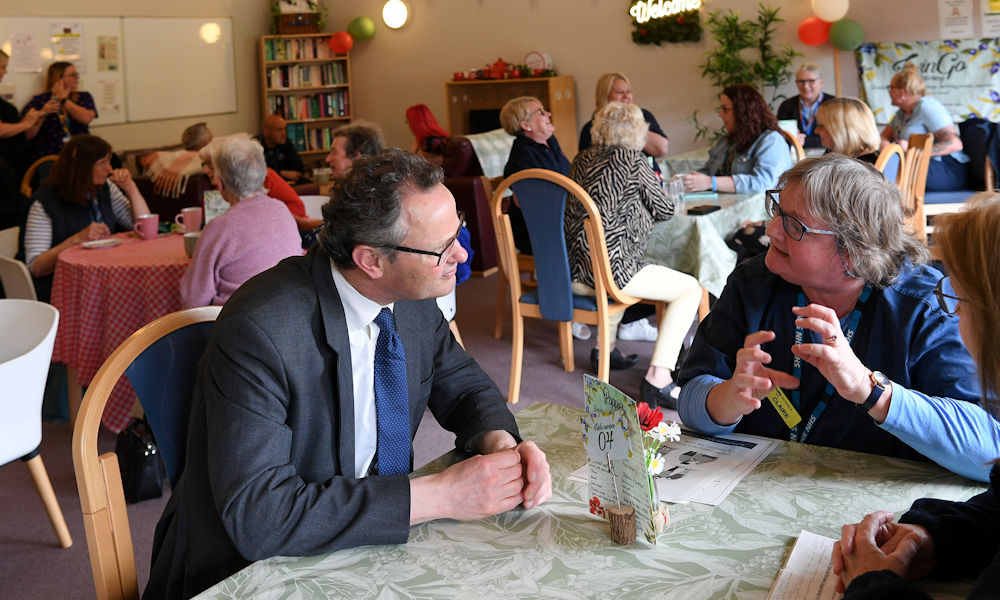Peter Aldous highlights the importance and value of local radio such as BBC Radio Suffolk and backs calls for the BBC to reconsider its plans to replace locally-produced output with shared content after 2pm which could mean Radio Suffolk broadcasting content from as far away as Buckinghamshire or Northampton.
Peter Aldous (Waveney) (Con)
I congratulate my right hon. Friend the Member for Hemel Hempstead (Sir Mike Penning) on securing this debate, and I thank the Backbench Business Committee for granting it.
Times are changing—often at a rapid pace—so I can understand the rationale behind the BBC’s plans. However, I am worried that its proposals have not been properly thought through, have not been fully researched, consulted upon or scrutinised, and risk isolating particular groups and communities that the BBC is obliged to serve. It is in that context that I make the following observations.
My first point is that if these proposals go through, at certain times Radio Suffolk will share content not only with Radio Norfolk, but with Radio Cambridgeshire, Three Counties Radio, which covers Bedfordshire, Hertfordshire and Buckinghamshire, and Radio Northampton and Radio Essex. The total population of all those counties is higher than that of Denmark and they cover an area three quarters the size of Belgium.
Secondly, it is necessary to bear in mind that older people are often living on their own without advanced digital skills. For them, local radio is a vital link to the outside world. In many respects, the need for such a service has been reinforced and restated by the covid lockdowns. The need to meet the needs of older people is very much relevant in East Anglia, where we have a particularly high proportion of older people living in the region.
Thirdly, it is vital that policy changes of this nature are subject to a rurality test to ensure that they do not unfairly impact on those living in rural areas, such as Suffolk. It is also important to highlight the role that BBC local radio has played at times of emergency and crisis. On the night of 5 December 2013, a storm surge hit the east coast of the UK. Radio Suffolk, led by presenter Mark Murphy, played a key role in keeping local communities and those responsible for co-ordinating support and rescue services informed about the progress of the storm surge down the Suffolk coast. The information provided may well have saved lives and prevented injury. It was a spontaneous and local decision by Radio Suffolk to alter its programming to provide that service. It has been suggested that local newspapers can take on this role, but it should be pointed out that many of them have embarked on the same journey that the BBC is now pursuing of moving their services on to digital platforms.
My final point is that it is important to emphasise that the BBC is not the only provider of local radio. East Suffolk One is emerging as an exciting new local radio station based in Lowestoft and covering the Suffolk coast. However, it is currently constrained from growing and developing by not being able to broadcast on a DAB frequency, by poor local DAB infrastructure, and by a time-consuming, bureaucratic and expensive commercial radio licensing structure. On 29 March, the Government published the draft Media Bill, which has the objective of reducing the regulatory burdens and costs on commercial radio stations. There is now an urgent need for this Bill to start its progress through Parliament, and I would welcome an update on the Government’s plans when my right hon. Friend the Minister replies.
In conclusion, I urge the BBC to pause and review its plans, and I ask the Government to liaise closely with the BBC to ensure that its proposals fit in with and complement a properly co-ordinated local media strategy.
Peter Aldous joined the other Suffolk MPs and pupils from Chantry High School to celebrate Suffolk Day. Fittingly, the pupils read out the Suffolk proclamation in Westminster Hall.

Peter Aldous calls on the Treasury to work with other Government Departments to ensure that the Lifelong Learning Bill gets rid of barriers preventing people on lower incomes from acquiring the new skills necessary for them to get better-paid jobs.
People on Lower Incomes: Financial Support
Peter Aldous (Waveney) (Con)
16. What steps he is taking to provide financial support to people on lower incomes. (905514)
The Financial Secretary to the Treasury (Victoria Atkins)
The Government recognise the challenges facing households as a result of the elevated cost of living, and we took further action in this year’s spring Budget to provide targeted support to protect the most vulnerable. That included the new cost of living payments this year, help with the cost of essentials through a further extension of the household support fund in England, and the uprating of benefits in line with inflation in April this year.
Peter Aldous
One of the best ways of supporting those on lower incomes is to remove the barriers that prevent them from acquiring the new skills that are necessary for better-paid jobs. Will my hon. Friend confirm that the Treasury is working closely with the Department for Education and the Department for Work and Pensions to ensure that the Lifelong Learning (Higher Education Fee Limits) Bill gets rid of those obstacles, and can she provide an update on the progress of the Barber review?
Victoria Atkins
I know that you like Ministers to answer briefly, Mr Speaker, so, if I may, I will answer my hon. Friend’s first question now and respond in writing to his question about the Barber review.
My right hon. Friend the Chancellor made employment one of the four Es in his drive for growth in the spring Budget, and we are working closely with the Department for Education to invest in exactly the way that my hon. Friend describes. That includes investment in free courses for jobs, which enable people to study high-value level 3 subjects and gain free qualifications, and employer-led skills bootcamps in high-growth areas—a phrase that I never thought I would find myself uttering—which, apparently, involve sectors such as digital, and are available to those who are either unemployed or in work and wanting to retrain.
Peter Aldous attended the Southern North Sea Energy Conference in Norwich to meet businesses investing in the region and hear what they need from government so that they can bring more jobs to the area.
Peter said:
“The offshore wind industry has come a long way over the past decade and we’ve seen significant investment locally, including Scottish Power Renewables’ Operations and Maintenance facility in the Hamilton Dock. There is a concern that rising costs of construction could impede growth. I raised this in the first debate on the Energy Bill, which has just started its journey through Parliament, and I shall continue to do so as the Bill moves forward.”

(Photos by kind permission of George Hersant Photography Ltd)


Peter Aldous formally reopened Poppies Community Café at Carlton Court Hospital.
Peter said:
“Achieving the best possible mental health for local people needs active contribution from all of those involved in the provision of health and care services. Initiatives like the Poppies Community Café make a powerful contribution to promoting patient, staff and community wellbeing. I wish it every success for the future and I thank Norfolk and Suffolk NHS Foundation Trust for inviting me.”
Poppies Community Café caters for all tastes and is open Monday–Friday 09.30–15.00.
Read more



Peter Aldous outlines how he believes we can meet the challenges to address the need for new homes, and consequently increase homeownership, improve public health and urban regeneration, and support levelling up efforts.
Peter Aldous (Waveney) (Con)
I thank the Backbench Business Committee for granting this important debate, and I congratulate my right hon. Friend the Member for Haltemprice and Howden (Mr Davis) on securing and leading it.
Before I came to this place, I practised as a chartered surveyor for 27 years in Suffolk and Norfolk. Much of my work focused on the residential development sector, advising landowners, house builders and local authorities. Today, my involvement revolves around meeting the needs of often desperate constituents seeking a decent home, addressing concerns about the pressure on infrastructure that arises from developments and working with local authorities to regenerate town centres.
The extent of the national housing crisis has been graphically illustrated by what we have heard across the Chamber this evening, and by the briefings provided by Crisis, the National Housing Federation and Policy Exchange. They all illustrate the advantages of a vibrant and dynamic house building sector. In the time available, I shall briefly highlight how I believe we can meet this major challenge.
First, it is important to focus on all sectors of the housing market, including the elderly. We need to ensure that we have sufficient and properly laid out and designed homes for older people. I mention that as I co-chair the all-party parliamentary group on housing and care for older people, along with Lord Best, who does much vital work in this sector. We have an ageing population who need and deserve properly adapted and comfortable homes. The provision of more such accommodation will free up other homes for others to move into.
Secondly, we must also build more homes for social rent. Crisis and the National Housing Federation both calculate that we need to build 90,000 homes for social rent each year if we are to tackle the current homelessness crisis. Policy Exchange also highlights that if we invest in and expand social house building, we will also restart the stalled conveyor belt of home ownership.
Thirdly, there is a need to improve the planning system, to ensure that all local planning authorities are functioning properly, have up-to-date local plans, supplemented by local design codes, and that they all determine planning applications promptly. Planning departments must be properly resourced and adequately staffed in order to do that, which means they need funding from national Government.
Fourthly, one of the solutions to the housing supply crisis is already in place in the form of Homes England, which does good work in facilitating development on challenging sites in urban areas and provides development finance through the levelling-up home building fund. It would help if its role and resources could be increased, so that it can do more to facilitate urban regeneration.
My fifth point is that we should consider whether there is a need for investment zones to promote the redevelopment of derelict sites in urban areas. In Lowestoft, in my constituency, the enterprise zone, which is focused on commercial development, has been a great success, although to a degree it has run out of steam and is in need of re-energising. The proposed investment zones, announced last September, provided a vehicle for doing that. The proposals, worked up by Suffolk County Council and East Suffolk Council, included three large, primarily residential redevelopment sites—the Sanyo, the Jeld Wen and the Brookes sites. It is disappointing that the plans for investment zones announced in the March Budget were much more limited than those originally proposed.
Finally, I am mindful of another challenge that confronts us in towns and cities across the country: the decline of our high streets and town centres, which urgently need revitalising. In those locations there are millions of square feet of former office and shop space, often on upper floors, and we need to promote and encourage their residential reuse. If we do that, we can provide customers for the shops and leisure facilities that remain in those town centres. Invariably, such properties can be difficult to convert, so developers prefer greenfield sites, too readily at times. We need to work with those developers to remove the barriers to carrying out town centre projects. As a start, the Government could consider the zero-rating of VAT for conversion and refurbishment work, so as to put such projects on a level playing field with new build.
In conclusion, increasing the supply of new housing opportunities is a panacea for many of the challenges that we face: providing people with warm and decent homes, enabling them to get that first important step on the housing ladder, improving the nation’s health, regenerating urban areas and town centres, and delivering meaningful levelling up.
Peter Aldous (Waveney) (Con)
In many ways, what my right hon. Friend is saying cuts across what I am going to say, which I think is because property values in Chelmsford are much higher than they are in Lowestoft. We are therefore illustrating what my hon. Friend the Member for Carlisle (John Stevenson) said, which is that we actually have lots of different property markets throughout the country. Would she not agree with me that what is right for one place may not necessarily be right for another?
Vicky Ford (Chelmsford) (Con)
I absolutely agree that what is right for one place may not be right for another. I would just like to point out that the purpose of all my suggestions is to enable local authorities to make the right decisions for their area. These would not be top-down quotas set by Government; they would not set the proportion of affordable homes to be put on which office block development. That would be the decision of the local authority in line with the local plan. At the moment, however, the local authority does not have that power at all.
